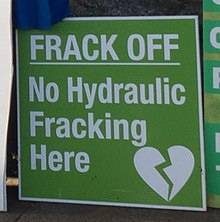Science Daily reports that:
“Using data from field experiments and modeling of ground faults, researchers at Tufts University have discovered that the practice of subsurface fluid injection used in ‘fracking’ and wastewater disposal for oil and gas exploration could cause significant, rapidly spreading earthquake activity beyond the fluid diffusion zone. Deep fluid injections — greater than one kilometer deep — are known to be associated with enhanced seismic activity — often thought to be limited to the areas of fluid diffusion. Yet the study, published today in the journal Science, tests and strongly supports the hypothesis that fluid injections are causing potentially damaging earthquakes further afield by the slow slip of pre-existing fault fracture networks, in domino-like fashion.”
The increasing use of hydraulic fracturing aka fracking to release oil and gas has shown its capacity to produce small earthquakes, considered to be unimportant by the industry and incapable of doing a lot of damage. However earthquakes above 5 points on the Richter scale have been observed and the present study carried out by Pathikrit Bhattacharya and Robert C. Viesca. Fluid-induced aseismic fault slip outpaces pore-fluid migration, and published in Science, 2019; 364 (6439): 464 DOI: 10.1126/science, warn about further risks of expanding seismic activity:
”The hazard posed by fluid-induced earthquakes is a matter of increasing public concern in the US. The human-made earthquake effect is considered responsible for making Oklahoma — a very active region of oil and gas exploration — the most productive seismic region in the country, including California. “It’s remarkable that today we have regions of human-made earthquake activity that surpass the level of activity in natural hot spots like southern California,” said Robert C. Viesca, associate professor of civil and environmental engineering at Tufts University’s School of Engineering, co-author of the study and Bhattacharya’s post-doc supervisor.”
Other risks
There has been some research into the Health, environmental and other risks of fracking creating international movements that oppose this technology E.g.: “There is concern over the possible adverse public health implications of hydraulic fracturing activity. A 2013 review on shale gas production in the United States stated, “with increasing numbers of drilling sites, more people are at risk from accidents and exposure to harmful substances used at fractured wells.” A 2011 hazard assessment recommended full disclosure of chemicals used for hydraulic fracturing and drilling as many have immediate health effects, and many may have long-term health effects. Wikipedia






